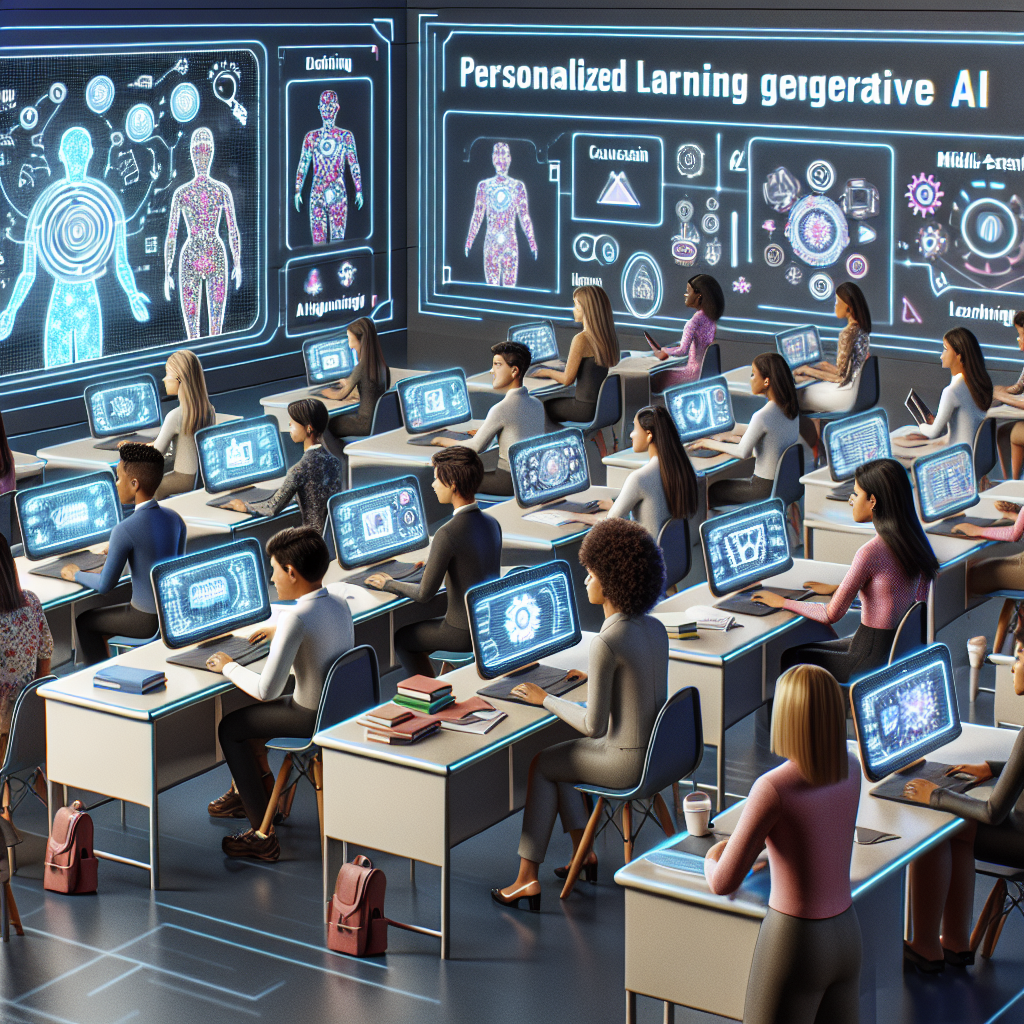Generative AI: Enabling Personalized Learning Experiences
Artificial Intelligence (AI) has been revolutionizing the way we live, work, and learn. One of the most exciting developments in the field of AI is Generative AI, which has the potential to transform personalized learning experiences for students of all ages.
Generative AI refers to a subset of AI that focuses on creating new and original content based on patterns and data it has been trained on. This technology uses algorithms to generate text, images, videos, and other forms of content that mimic human creativity. In the context of education, Generative AI can be used to create personalized learning experiences that cater to the individual needs and preferences of each student.
One of the key benefits of Generative AI in education is its ability to create adaptive learning experiences that can adjust to the pace and learning style of each student. Traditional educational models often rely on a one-size-fits-all approach, where all students are expected to learn at the same pace and in the same way. This can be ineffective for students who learn at different speeds or have different learning preferences. Generative AI can help address this issue by creating personalized learning experiences that are tailored to each student’s unique strengths and weaknesses.
For example, a Generative AI system could analyze a student’s performance on a series of quizzes and assessments and generate personalized learning materials that target specific areas where the student is struggling. These materials could include interactive exercises, videos, or other resources that cater to the student’s learning style and preferences. By providing targeted support and feedback, Generative AI can help students overcome learning challenges and achieve their full potential.
Another key advantage of Generative AI in education is its ability to create engaging and immersive learning experiences. Traditional educational materials such as textbooks and lectures can be dry and uninspiring, making it difficult for students to stay engaged and motivated. Generative AI can help address this issue by creating interactive and visually appealing learning materials that capture students’ attention and make learning more enjoyable.
For example, a Generative AI system could create a virtual reality simulation that allows students to explore the solar system and learn about the planets in a hands-on and interactive way. By immersing students in a realistic and engaging learning experience, Generative AI can help spark their curiosity and enthusiasm for learning.
Generative AI can also help address the issue of limited resources in education. Many schools and educational institutions struggle to provide personalized support and resources to every student due to budget constraints and staffing limitations. Generative AI can help bridge this gap by creating personalized learning materials that can be accessed by students anytime, anywhere.
For example, a student who is struggling with a particular concept could access a virtual tutor created by Generative AI that provides step-by-step explanations and examples to help them understand the material. By providing on-demand support and resources, Generative AI can help students overcome learning challenges and access the support they need to succeed.
Despite the many benefits of Generative AI in education, there are also challenges and considerations that need to be addressed. One of the key concerns is the potential for bias in AI algorithms. Generative AI systems are trained on large datasets of existing content, which can contain biases and stereotypes that are present in society. If these biases are not addressed, they can be perpetuated and reinforced by Generative AI, leading to unfair and discriminatory outcomes.
To address this issue, developers and educators need to be mindful of the data that is used to train Generative AI systems and actively work to reduce bias and ensure fairness in the algorithms. This can be done by diversifying the training data, conducting regular audits of the algorithms, and implementing transparency and accountability measures to monitor and address bias.
Another challenge of Generative AI in education is the potential for overreliance on technology and automation. While Generative AI can create personalized learning experiences and support students in their learning journey, it is important to remember that human interaction and guidance are also essential for student success. Teachers and educators play a crucial role in providing mentorship, support, and feedback to students, and should not be replaced by AI technologies.
Generative AI should be viewed as a tool to enhance and complement the work of educators, rather than a substitute for human interaction. By leveraging the strengths of both AI and human teachers, schools and educational institutions can create a holistic and effective learning environment that meets the needs of all students.
In conclusion, Generative AI has the potential to revolutionize personalized learning experiences and support student success in education. By creating adaptive, engaging, and immersive learning materials, Generative AI can help students overcome learning challenges, access personalized support, and achieve their full potential. However, it is important to address challenges such as bias and overreliance on technology to ensure that Generative AI is used responsibly and ethically in education.
FAQs
Q: How does Generative AI work in education?
A: Generative AI uses algorithms to create new and original content based on patterns and data it has been trained on. In education, Generative AI can be used to create personalized learning experiences that cater to the individual needs and preferences of each student.
Q: What are the benefits of Generative AI in education?
A: Generative AI can create adaptive learning experiences, engage and immersive learning materials, and provide on-demand support and resources for students. It can help students overcome learning challenges, access personalized support, and achieve their full potential.
Q: What are the challenges of Generative AI in education?
A: Some of the challenges of Generative AI in education include the potential for bias in AI algorithms, overreliance on technology, and the need to balance AI technology with human interaction and guidance. It is important to address these challenges to ensure that Generative AI is used responsibly and ethically in education.

